
The International Vienna Motor Symposium
takes place annually and is one of the worldwide leading events of this kind.
Every year, over 1,000 decision-makers from the most important companies in the global automotive industry gather at the Vienna Motor Symposium. The three-day programme at the Hofburg Conference Centre Vienna offers a variety of groundbreaking lectures and allows sufficient time for exchanging opinions and networking.
This top-level lecture programme is accompanied by an exhibition at which leading automotive and component companies present latest technologies and developments.
The 46th International Vienna Motor Symposium has taken place from 14 to 16 May 2025.
Call for Papers 2026 - First Announcement
We cordially invite you to submit lecture proposals referring to the following topics:
We would like to cordially invite to submit lecture proposals for next year’s 47th International Vienna Motor Symposium, 22-24 April 2026.
Planned Topics:
- Electric Drives and their Components
- Battery Electric Storages and Charging Technologies
- Combustion Engine Drives and their Components / Hybrids
- H2 Energy & Storage / Green Energies (Green Electricity & eFuels)
- Legal Framework: CO2, Toxic Emissions
- New Vehicle and Mobility Concepts / Software Defined Vehicle / ADAS
- Industrial Transformation / Structural Change in the Automotive Industry / Production & Markets
Please note that only unpublished contributions will be accepted, and they must not be released for publication before the Motor Symposium in April 2026.
Submissions are only possible via the online form below.
Please use for the abstract this template, opens new window.
We look forward to receiving your submissions by 30 September 2025 at the latest.
to abstract submission and additional information >>>, opens new window
Alternative fuels: EU legislation plays into the hands of the USA and China
The International Vienna Motor Symposium 2025 offered a wide-ranging scientific overview of sustainable energy sources for cars, lorries, ships, aircraft and motorsport.
The energy transition, the switch from fossil fuels to renewable fuels, will be lengthy and expensive. Currently, around 23 per cent of global greenhouse gas emissions come from transport, with cars and vans accounting for almost 50 per cent of this. The battery-electric drive alone is not enough to defossilise traffic. Although it has made great progress, "it is not the ideal solution for all areas. Even in a completely defossilised future, liquid and gaseous fuels will be needed to ensure a secure supply of energy". The alternative drives ‘can also be more economical, more social and more environmentally friendly than battery electric drives.’
Read the full press release here, opens new window.
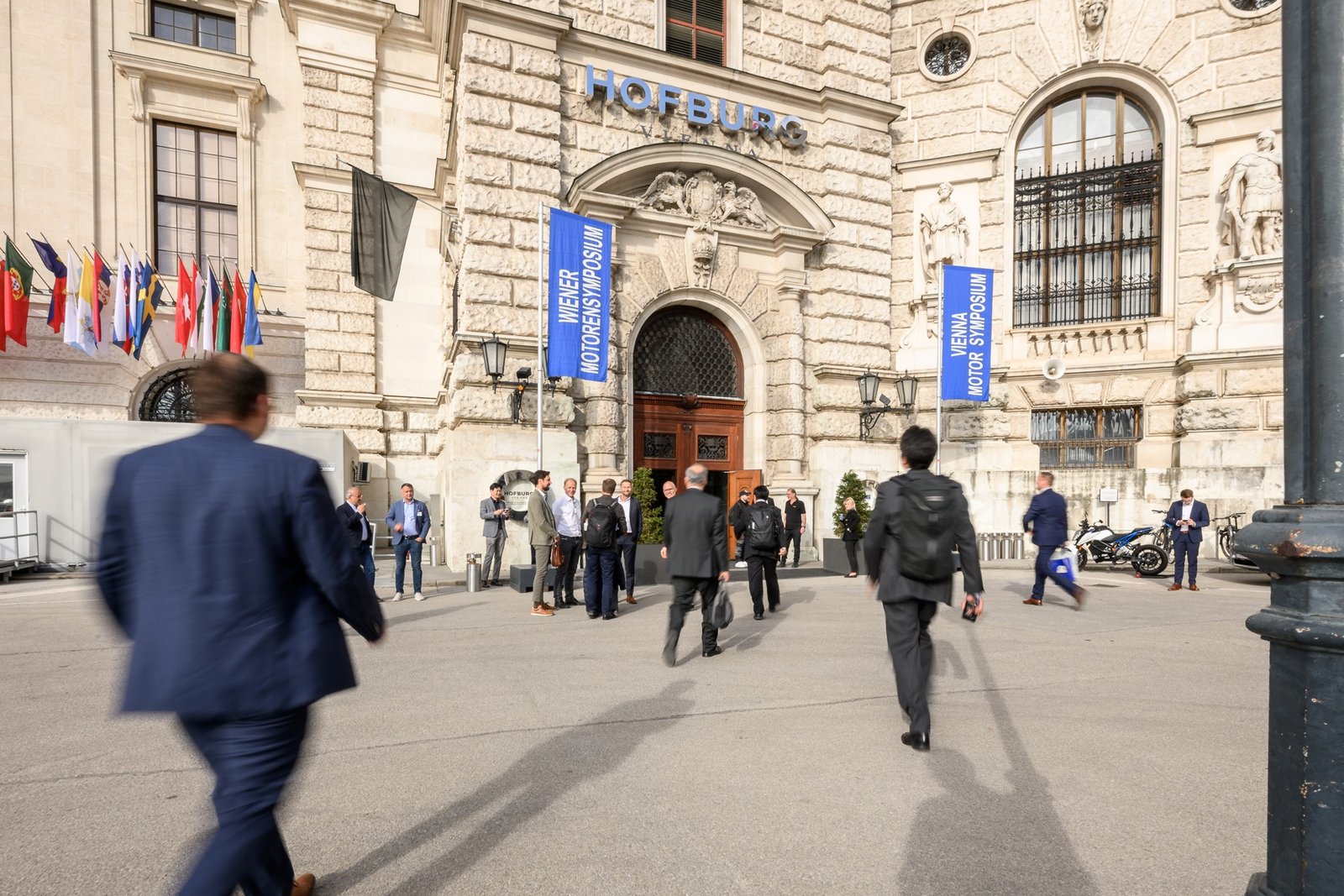
Serious defossilisation requires all technically possible solutions
Over 1,000 people from research, development and global industry discussed drive systems and energy sources for climate-neutral mobility on land, water and in the air.
In order to phase out fossil fuels and bring the ‘anthropogenic increase in greenhouse gases’ under control, we need not just one, but all technically and economically feasible solutions. Organiser of the International Vienna Motor Symposium, TU Professor Bernhard Geringer, emphasised at the opening of this 46th summit of global vehicle and engine developers and the vehicle industry, that the assessment of ‘Net Zero Mobility’ must not only consider emissions during operation, but the entire cycle of a vehicle from raw material extraction and production to disposal. ‘The goal should be more accurately referred to as ‘defossilisation’ instead of ‘decarbonisation’. To achieve this goal, we need a concerted effort and the full physical variety of climate-neutral energy sources, including the appropriate drive technologies.’
Read the full press conference release here, opens new window.
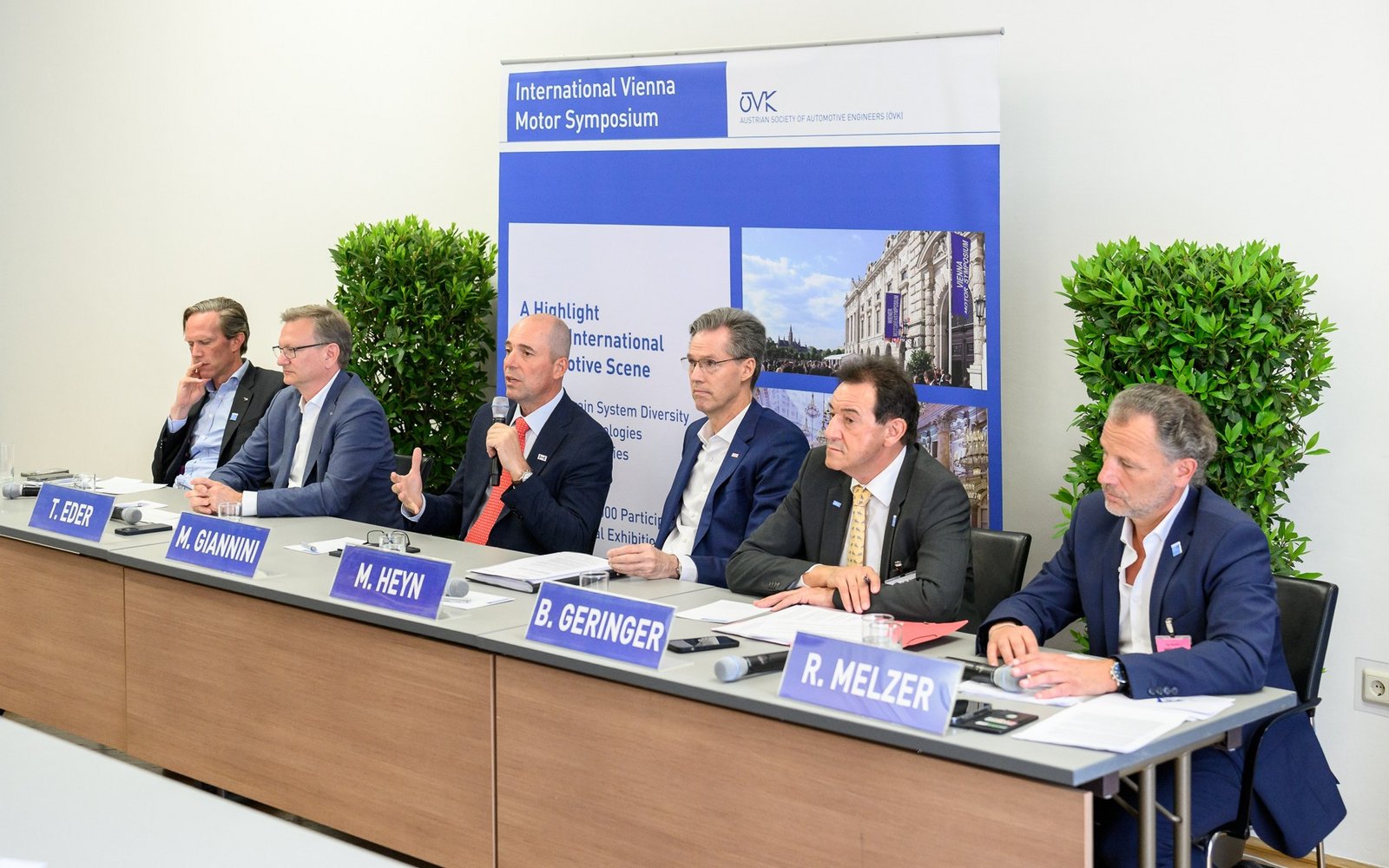
Moving away from the ‘exhaust pipe perspective’: a fundamental shift in our approach to sustainable mobility is urgently needed.
Bernhard Geringer, Chairman of the Board of the Austrian Society of Automotive Engineers (ÖVK) and organizer of the symposium, offered a foretaste of the content highlights of the upcoming engine symposium during a press conference with Frederik Zohm from MAN Truck & Bus SE and Ingo Scholten from Horse Powertrain.
Current legislation which focuses on the CO2 emissions of a vehicle, without taking into account the generation of energy and raw materials, is wrong, does not help the environment and must be changed as quickly as possible. Meaningful climate protection will only be achieved with a systematic ‘cradle-to-grave’ approach. We have to move away from the ‘exhaust pipe perspective’!
There is no such thing as a ‘green’ engine, but there is green energy. It is imperative to push ahead with a focus on green energy sources if we are to enable truly carbon-neutral mobility worldwide.’
There is no one single path towards sustainable mobility but many routes which need to be pursued simultaneously. At this year’s summit, manufacturers of new drive concepts from Asia and investors from the Arab world are increasingly coming into focus. A joint venture between the Chinese manufacturer Geely with the European Renault Group and Saudi Aramco, for example, which was founded only a year ago, promises to revolutionize one of the traditional pillars of automotive engineering.
Ingo Scholten, Chief Technology Officer at Horse Powertrain, described the event as ‘pioneering work in a new industrial sector’. A key figure in shaping the up-and-coming powertrain technology sector, he presented a forward-looking vision: ‘The powertrain is no longer just a vehicle component – it has evolved into a complete technology sector that drives the future of mobility.
Drives for commercial vehicles, from electric solutions for local distribution transport and urban buses through to large combustion engines for long-distance transport, some of which are powered by hydrogen, will be prominent agenda items at this year’s international meeting of experts. Dr Frederik Zohm, Executive Board Member for Research & Development at MAN Truck & Bus, said: ‘In order to decarbonise road freight transport, our focus is on battery-electric vehicles. These currently have clear advantages over other drive concepts in terms of energy efficiency and operating and energy costs. We therefore expect electric trucks to be best suited to the vast majority of transport applications
The video recording of the press conference is available here, opens new window, a full press relase is available for download.
Driving the Future: Global Mobility Experts Converge at Vienna’s 46th Motor Symposium
Whether cars, commercial vehicles, ships or aircraft, the global mobility industry is currently changing faster than ever. On the one hand, traditional manufacturers are facing major challenges with new technologies, while on the other, young companies are bringing a breath of fresh air to drive systems, fuels and global cooperation. Experts from all over the world will present the latest developments and technology trends for motor vehicles, aviation, aerospace and shipping at the International Motor Symposium from 14 to 16 May 2025 at the Hofburg Conference Centre in Vienna.
“Is there more than one solution on the road to Net Zero?” – This question will be addressed at the opening of the symposium by Matias Giannini, CEO of Horse Powertrain (London), a new manufacturer of compact drive units. He heads a joint venture founded by Geely (China), Renault (France) and Aramco (Saudi Arabia) with the aim of supplying powertrains consisting of combustion engines and compact hybrid drive systems in modular design, for a wide range of vehicles and manufacturers.
Also speaking at plenary sessions will be: Vice President and Chief Technology Officer of fuel injection systems manufacturer PHINIA (USA), Todd Anderson; VW Board Member Kai Grünitz; Holger Klein, CEO of ZF Group (Friedrichshafen); Bosch Managing Director Markus Heyn; Torsten Eder, Vice President Electrified Drive Systems Mercedes Benz (Stuttgart) and MAN Trucks & Bus Board Member for Research and Development, Frederik Zohm (Munich).
We are delighted to welcome experts and decision-makers with a wealth of knowledge and experience from both OEMs and the supplier industry to Vienna!
Car manufacturers around the world are currently moving away from developing their own engines and powertrains. Ready-made, compact drive units from companies such as Horse Powertrain are therefore becoming increasingly important.
Commercial vehicles: The race is not yet decided
Drive systems for lorries and buses, ranging from electric solutions for local distribution transport and urban buses, to large combustion engines for long-distance transport will be given significant space in the programme. For example, the US engine manufacturer Cummins will be presenting a 6.7-litre hydrogen engine with direct injection, while Volvo will be presenting the concept of a 17-litre hydrogen combustion engine with low-pressure direct injection for heavy commercial vehicles. MAN will be presenting a V12 engine with a displacement of 30 litres, which is intended to achieve the balancing act between sustainability, economy and customer benefits . The mega-engine is likely to be used more in the railway and marine sectors rather than for commercial vehicles.
A “robust fuel cell vehicle for the mining and construction site environment” as well as various options for using liquid hydrogen as a storage option for rail vehicles will also be presented during the three-day conference.
Innovations in powersport drives
This year’s conference will be the most wide-ranging yet. The conference will not only look at large-volume drive systems for ocean-going vessels, construction and rail vehicles.
Lightweight, fast and yet environmentally-friendly engines for powersports equipment such as skidoos or jet skis or side-by-side off road vehicles are also on the agenda. The Austrian-Canadian company BRP-Rotax will provide insights into its new electric and hybrid drive concepts.
Powerhouses also at Lamborghini and Porsche
A panel will be dedicated to sustainable fuels, for example, self-igniting piston aircraft engines, and new concepts in the sports car sector will be presented. Among other high-profile manufacturers, Lamborghini will show its high-revving biturbo V8 hybrid engine and Porsche its hybridisation of the 911 and a new six-cylinder boxer engine.
Conference Papers 2025
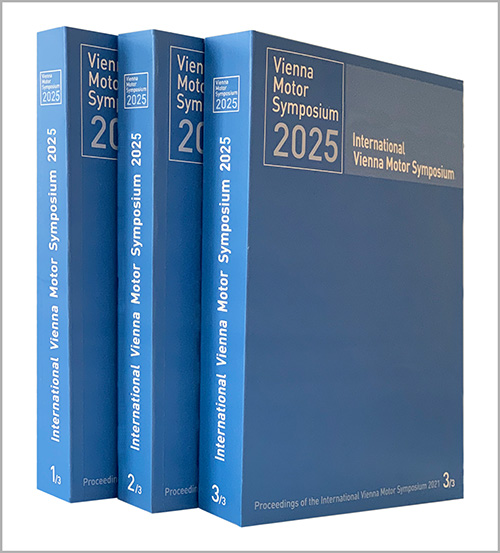
The 46th International Vienna Motor Symposium took place from 14-16 May 2025. The conference papers for this event can be ordered from the Austrian Society of Automotive Engineers and will be dispatched after the receipt of the payment.
All lectures are presented on approx. 1600 pages in 3 volumes including additional booklets.
The lecture documents can be ordered as a print version or as a USB flash drive. Both versions contain a download link with the complete lectures.
Mediadatabase
Press Photos – Images – Press Releases
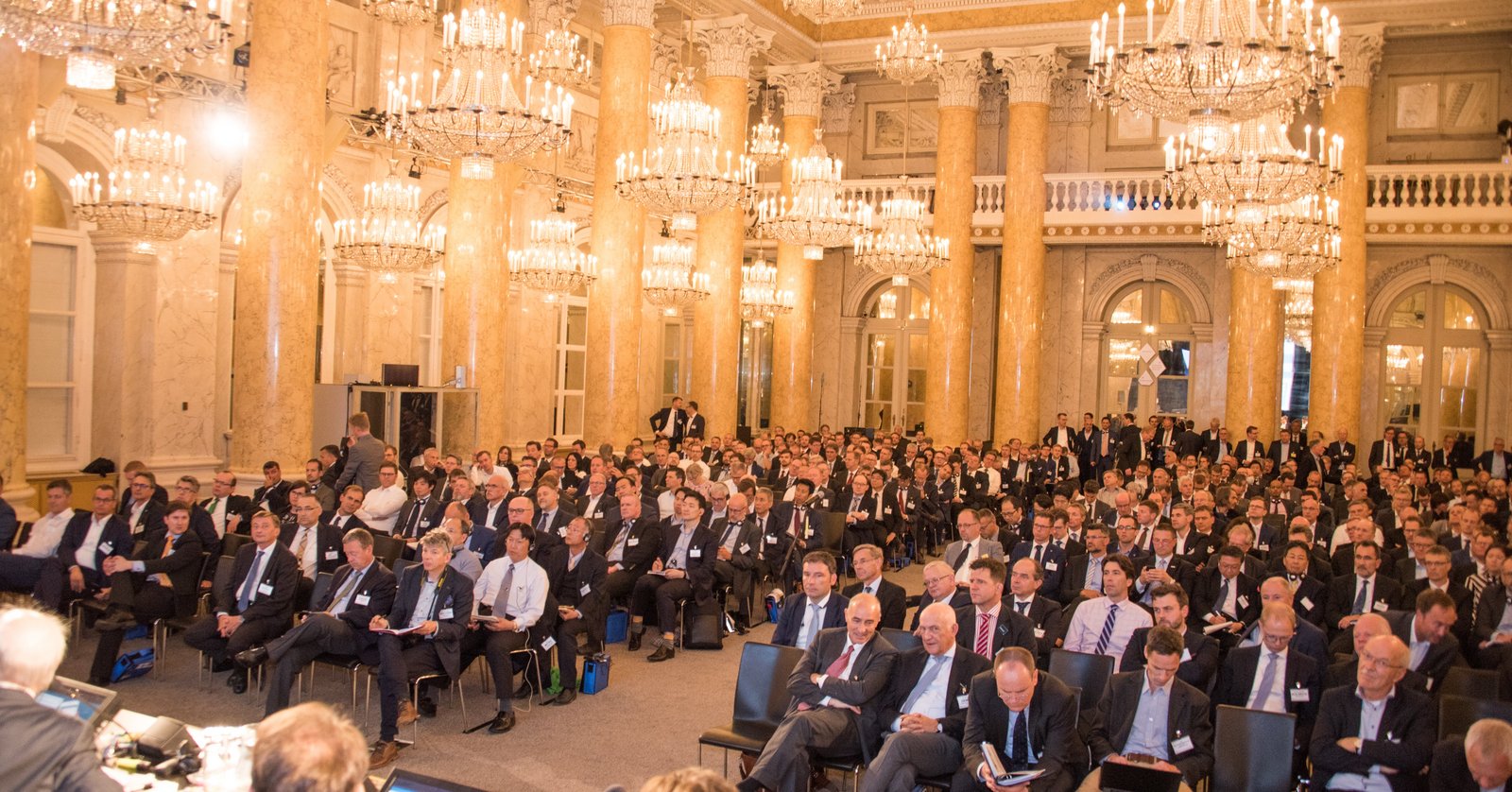
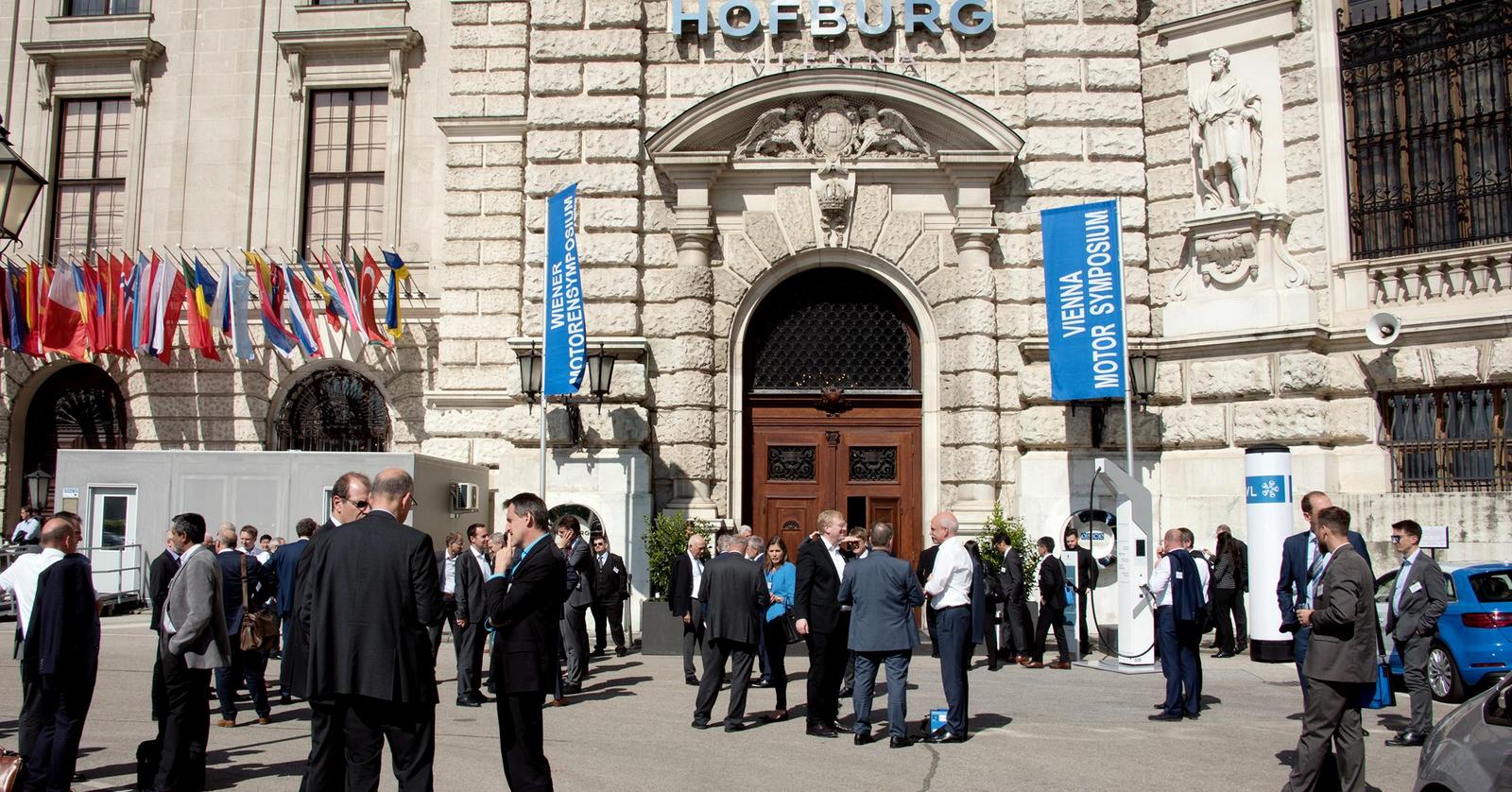
Announcement
47th International Vienna Motor Symposium: 22 - 24 April 2026
48th International Vienna Motor Symposium: 21 - 23 April 2027